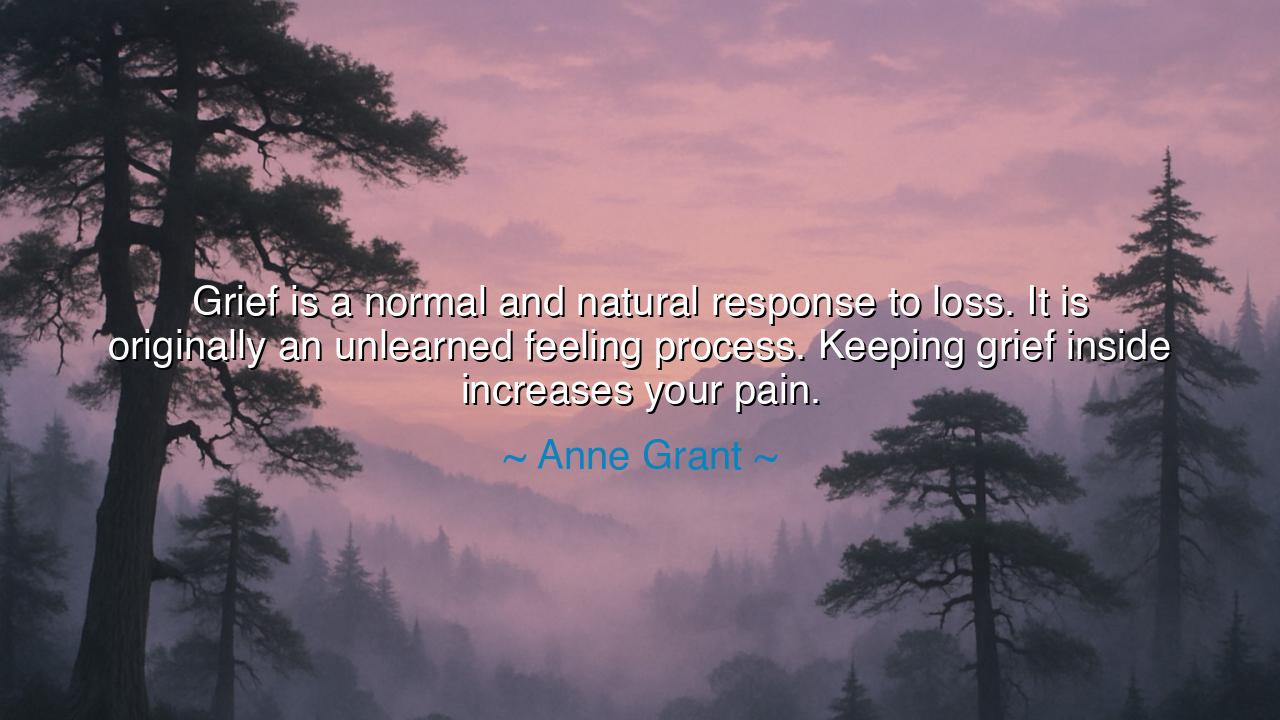
Grief is a normal and natural response to loss. It is originally
Grief is a normal and natural response to loss. It is originally an unlearned feeling process. Keeping grief inside increases your pain.






Anne Grant, a voice of quiet wisdom, declared: “Grief is a normal and natural response to loss. It is originally an unlearned feeling process. Keeping grief inside increases your pain.” In these words she strips away illusion and teaches us to see sorrow not as an enemy, but as a companion on the path of life. For wherever there is love, there must one day be loss, and wherever there is loss, there must come grief. To deny this is to deny our humanity. To lock grief within the heart is to forge a prison in which sorrow festers, while to let it flow is to allow healing to begin.
The ancients knew this truth and honored it. In the tragedies of Athens, men and women cried openly before the gods and their people. Their mourning was not weakness but strength, for by wailing, tearing garments, and raising laments, they gave voice to their sorrow and found release. To feel grief is unlearned, as Anne Grant says — it belongs to us from birth, as instinctive as hunger or thirst. It is the silence that is taught, the hiding of sorrow that is artificial. Thus the wise knew that grief, if swallowed and smothered, would turn to poison in the soul.
Consider the story of Queen Victoria of England. When her beloved Albert died, she sank into years of shadow. She did not hide her grief but wore it outwardly, draping herself in black, withdrawing from courtly gaiety, and letting her sorrow be seen by all. Though some criticized her retreat, her people also felt the depth of her loss, and their sympathy for her grew. She bore her mourning not as a secret wound, but as a public truth. And in this way, her grief bound her closer to her nation, who also suffered war, famine, and hardship. She showed that grief expressed is grief shared, and grief shared becomes more bearable.
Grant’s words also carry a warning: “Keeping grief inside increases your pain.” How many have perished under the weight of hidden sorrow? The soldier who returns from war and speaks to no one of the horrors he has seen; the widow who smiles but cries only in silence; the child who hides their tears because they are told to “be strong.” In each, the hidden grief becomes a heavy stone pressing against the heart. What could have been released in tears, in words, in the comfort of others, becomes a burden that crushes slowly, day by day.
But grief expressed does not destroy — it transforms. When one weeps, when one speaks the unspeakable, the wound begins to breathe. And when another listens, another holds the grieving hand, two hearts share the same sorrow, and the pain lightens. This is why funerals, laments, and rituals of mourning exist across all cultures: they give form to grief, they honor it, and they make it communal. By bringing grief into the open, we let love continue even after loss has struck.
The lesson, then, is clear. When you are wounded by loss, do not hide your sorrow. Speak it, sing it, write it, weep it. Let it be seen, for it is not shameful but sacred. And when others grieve, do not flee from their tears, but sit with them, listen to them, and honor their pain. In this way, grief becomes not a solitary prison but a shared passage, where pain turns into remembrance and remembrance into strength.
So remember, O children of time: grief is not an enemy to be silenced, but a teacher to be honored. It is normal and natural, as Anne Grant says, and in expressing it we open the gates of healing. Let your sorrow flow, and do not fear its flood, for though it shakes you, it also cleanses you. In giving voice to grief, you honor the love that gave it birth. And when the storm passes, you will find yourself still standing, heart tempered by tears, ready to carry forward the memory of what was lost into the light of what remains.






AAdministratorAdministrator
Welcome, honored guests. Please leave a comment, we will respond soon